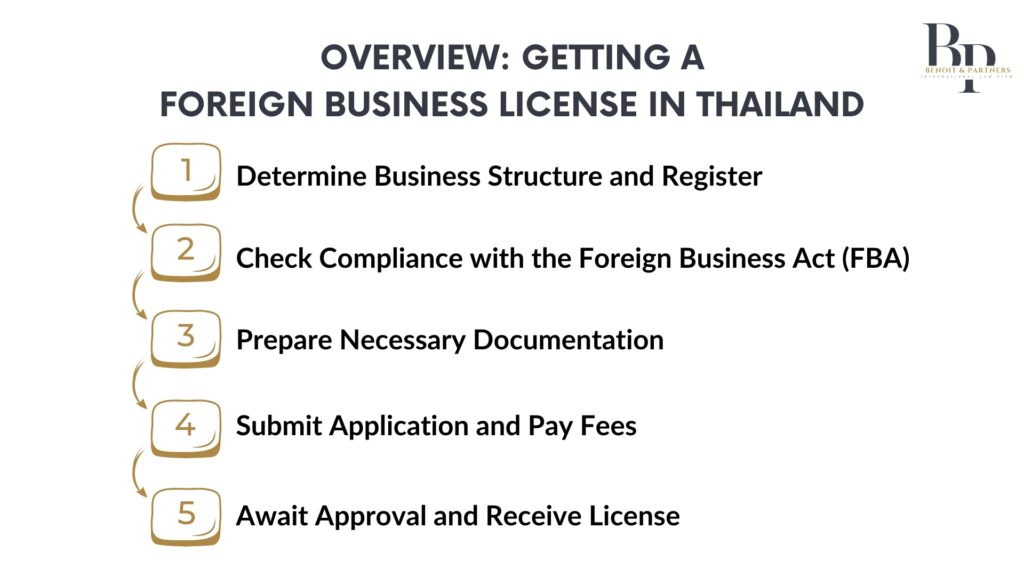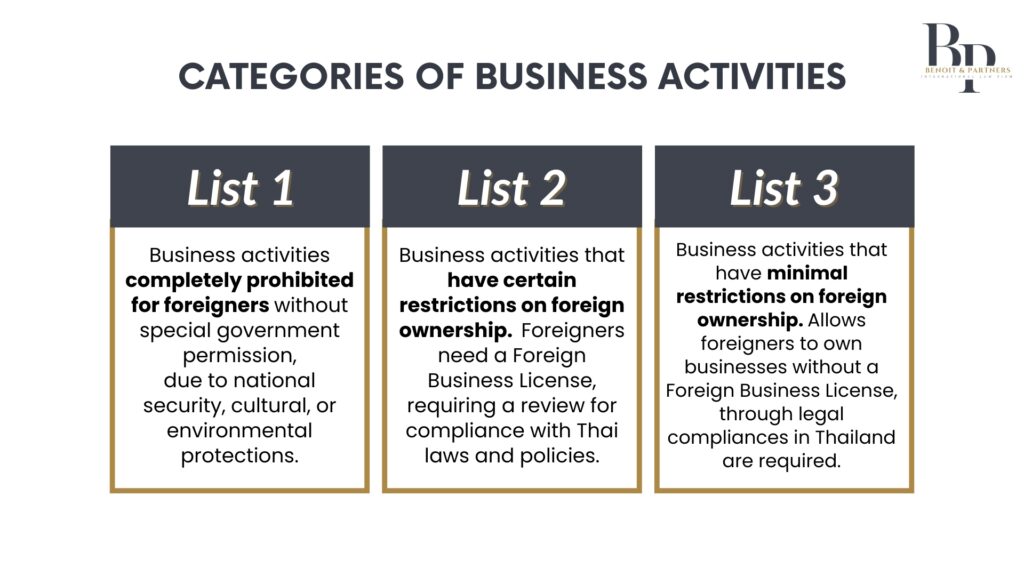Call us now:

How to Obtain a Foreign Business License in Thailand
Any foreigner intending to build a business in Thailand must hold a foreign business license. Such mandate was established to ensure compliance with Thai rules and regulations by foreign entrepreneurs. It is the only means of conducting business that is primarily a preserve of Thailand’s nationals. Consequently, applicants must follow a clearly defined procedure to obtain this license.
The application for a foreign business license is backed by numerous documents and compliance with particular local business laws. The time and efforts spent on getting permits have to be taken into consideration of potential business runners.
Table of Contents
Overview of the Process to Obtain a Foreign Business License in Thailand
This overview outlines the essential steps for foreigners to legally establish and obtain a foreign business license in Thailand :

What are the benefits ?
Obtaining a foreign business license in Thailand offers several significant benefits for international entrepreneurs and companies. Here are some of the key advantages.
- Legal Compliance and Market Access: Enables foreign entities to legally operate in sectors that are otherwise restricted to Thai nationals and opens up a broader range of business opportunities within the Thai market.
- Enhanced Credibility: Enhances a company’s credibility not only with local authorities but also with business partners, suppliers, and customers. This can be advantageous in securing business deals and building trust.
- Eligibility for Investment Incentives: Eligible for various incentives offered by the Board of Investment (BOI) in Thailand, such as tax breaks, import duty exemptions, and other financial benefits that are designed to attract and support foreign investment.
- Property Ownership: May gain the right to own property in Thailand under certain conditions. This is a crucial benefit for businesses that require physical premises.
- Long-term Business Visas and Work Permits: Facilitates the issuance of business visas and work permits for foreign nationals associated with the company, helping to hire foreign workers and support their stay in Thailand.
- Operational Stability: Provides a higher degree of operational stability and predictability under the regulatory frameworks of Thailand, reducing risks associated with legal non-compliance.
- Expansion of Services: Can expand into areas that are typically restricted, thereby increasing the potential for business growth and diversification.
- Access to Local Financing: Companies with a foreign business license may find it easier to access funding from Thai banks and financial institutions, as they are recognized as legitimate and compliant entities within the country.
Understanding the Foreign Business Act and Foreign Business License
The Foreign Business Act (FBA) is the cornerstone legislation governing foreign investment and business activities in Thailand. This law stipulates the regulations and restrictions regarding foreign ownership and operation of businesses in the country. It categorizes business activities into three lists: List 1, List 2, and List 3, each with different levels of restrictions for foreign ownership.Below is a detailed description of each list, regarding information for the foreign business license.

Please refer to the next section for the specific business activities under each list.
What business activities can you conduct under this license ?
Before applying for a foreign business license, determine the type of business activities you intend to conduct and their classification under the Foreign Business Act. Here’s an in-depth look at the types of activities allowed under each list:
First list: Business Activities Prohibited for Foreigners
- Land Ownership: Foreign ownership of land is generally prohibited under Thai law, with exceptions for certain types of land leases.
- Retail Business: Engaging in retail or wholesale businesses, including trading, purchasing, or selling goods, is restricted to Thai nationals. However, there are exceptions for certain types of retail businesses.
- Mass Media: Operating newspapers, radio stations, television stations, or any other form of mass media is restricted to Thai nationals.
- Legal Services: Providing legal services, including advocacy, legal consultation, or representation in Thai courts, is restricted to Thai lawyers.
- Tourist Guide Services: Providing services as a tourist guide is restricted to Thai nationals.
Second list: Business Activities Subject to Restrictions
- Hotel Operation: Owning and operating hotels, resorts, or similar accommodations.
- Food and Beverage Services: Establishing restaurants, bars, or catering services.
- Retail and Wholesale Businesses: Certain types of retail and wholesale businesses may be allowed with restrictions, such as limitations on the size of the business or the location.
- Education Services: Providing education services, including schools, universities, or vocational training centers.
- Tourism-Related Services: Operating travel agencies, tour operators, or tourist transportation services.
Third list: Business Activities Open to Foreign Ownership
- Export Business: Engaging in the export of goods or services.
- Manufacturing: Establishing manufacturing plants or factories.
- Technology and Innovation: Investing in technology-based businesses, research and development, or innovation hubs.
- Consulting Services: Providing consulting services in various fields, such as management, engineering, or IT.
- Healthcare Services: Operating hospitals, clinics, or medical facilities.
What is the step-by-step procedure ?
To obtain a foreign business license in Thailand, follow these steps carefully to ensure a smooth and successful application process.
- Choose Your Business Structure: Decide on the structure of your business in Thailand, whether it’s a limited company, partnership, branch office, or representative office.
- Company Registration: Register your business entity with the Department of Business Development or the Ministry of Commerce, depending on the type of business structure chosen.
- Determine FBA Compliance: Ensure that your proposed business activities comply with the FBA and fall within the permissible categories for foreign ownership. If your business falls under List 2, you’ll need to apply for a Foreign Business License.
- Prepare Required Documents: Gather the necessary documents for your foreign business license application. Please find the in depth details for the documents needed in the section below.
- Submit Application: Submit your foreign business license application to the Department of Business Development or the Ministry of Commerce, along with the required documents and application fee.
- Review and Approval: The authorities will review your application and documents to ensure compliance with the FBA and other regulations. This process may take several weeks to months, depending on the complexity of the application. They will verify that your business activities align with the FBA and that you meet the criteria for foreign ownership.
- Receive License: Once your application is approved, you will receive your foreign business license, allowing you to legally operate your business in Thailand.
For expert legal guidance, consult our lawyers at Benoit and Partners, who are experienced in Thai business law and can help navigate the complexities of obtaining a foreign business license.
What are the key documents needed for the foreign business license ?
Listed below are all the key documents needed to be prepared for the application of the foreign business license.
- Company Registration Documents: Certificate of incorporation, memorandum of association, articles of association.
- Business Plan: Outline your business objectives, activities, investment plan, and expected benefits for Thailand.
- Financial Statements: Provide financial statements, including balance sheets and income statements.
- List of Shareholders and Directors: Include details of all shareholders and directors, both foreign and Thai.
- Proof of Capital: Demonstrate sufficient capital for investment in the proposed business activities.
- Details of Business Activities: Describe in detail the nature of the business activities you intend to conduct in Thailand, specifying the industry, products or services offered, target market, and any special requirements.
- Other Supporting Documents: Depending on the nature of your business, additional documents may be required, such as environmental impact assessments or licenses for specific industries.
Key considerations to keep in mind when obtaining a foreign business license
Ensuring a successful application process for a foreign business license in Thailand requires careful attention to several key considerations.
- Business Activities: Ensure that your proposed business activities are permissible under the FBA and do not fall under restricted categories.
- Foreign Ownership: Be aware of the percentage of foreign ownership allowed for your business activities.
- Minimum Capital Requirements: Some business activities require a minimum amount of capital investment as per the FBA.
- Legal Assistance: It’s advisable to enlist the support of a legal advisor or consultant proficient in Thai business law to assist you throughout the process. Our team at Benoit & Partners is here to provide expert guidance.
- Renewal and Compliance: Foreign business licenses are typically valid for a certain period and must be renewed periodically. Ensure ongoing compliance with Thai laws and regulations.
Navigating the complexities of obtaining a foreign business license in Thailand can be challenging. At Benoit & Partners, our team of expert lawyers is here to simplify this process for you. With our comprehensive legal support, you can ensure that your business complies with all regulations and secures your license efficiently. Contact us today to find out how we can assist you in launching and growing your business in Thailand.
